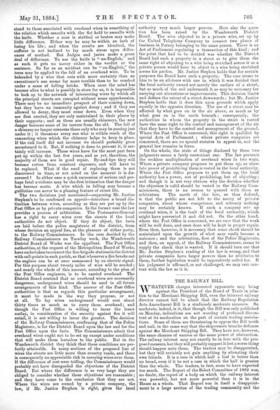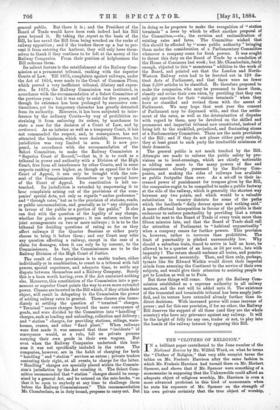THE RAILWAY * BILL.
WHATEVER charges interested opponents may bring- against the President of the Board of Trade in rela- tion to the Merchant Shipping Bill, even the bitterest railway director cannot fail to admit that the Railway Regulation Acts Amendment Bill is a studiously moderate measure. So moderate, indeed, is it, that though the Bill was only published on Monday, indications are not wanting of profound discon- tent at its moderation on the part of certain trading associa- tions. Some of them are threatening to oppose the Bill tooth and nail, in the same way that the shipowners breathe defiance against the Merchant Shipping Bill. They have not, however, the same chances of success or the same power of obstruction. The railway interest may not exactly be in love with the pro- posed measure, but they will probably support it lest a worse thing should happen unto them. The traders may be disappointed, but they will certainly not gain anything by alienating their own friends. It is a case in which half a loaf is better than no bread, even if it be not a case in which the half is greater than the whole. The traders, in fact, seem to have expected too much. The Report of the Select Committee of 1882 was, no doubt, the report of a body on which the railway interest was powerful, but not more powerful than it is in the House as a whole. That Report was in itself a disappoint- ment to a large section of the trading community and the general public. But there it is ; and the President of the Board of Trade would have been rash indeed had his Bill gone beyond it. By taking the .report as the basis of the Bill, he has saved the Bill from being wrecked on the rocks of railway opposition ; and if the traders throw up a bar to pre- vent it from entering the harbour, they will only have them- selves to thank if they continue to be left at the mercy of the Railway Companies. From their position of helplessness the Bill redeems them.
Its salient feature is the establishment of the Railway Com- mission as a permanent tribunal, ranking with the superior Courts of Law. Till 1873, complaints against railways, under the Act of 1854, were made to the Court of Common Pleas, which proved a very inefficient tribunal, dilatory and expen- sive. In 1873, the Railway Commission was instituted, in accordance with the recommendation of a Select Committee of the previous year ; but it was only to exist for five years, and though its existence has been prolonged by successive con- tinuations, yet its temporary character has greatly detracted from its authority. Moreover, it has been subjected to inter- ference by the ordinary Courts—by way of prohibition re- straining it from enforcing its orders, by mandamus to state a case for the decision of a Court of Law, and by certiorari. As an inferior as well as a temporary Court, it has not commanded the respect, and, in consequence, has not attracted the business, which were desirable. Moreover, its jurisdiction was very limited in area. It is now pro- posed, in accordance with the recommendation of the Select Committee, to make the Railway Commission a "Superior Court of Record,"—that is, it is to rank as a tribunal in power and authority with a Division of the High Court, free from all interference by other Courts, and in some respects ranking even higher, as, though an appeal lies to the Court of Appeal, it can only be brought with the con- sent of the Commissioners themselves or by special leave of the Court of Appeal. Its constitution is left un- touched. Its jurisdiction is extended by empowering it to hear complaints arising out of the provisions of the com- panies' special Acts, not only as regards "undue preference" and "through rates," but as to the provision of stations, roads, or public accommodation, and generally as to "any obligation in favour of the public or a portion of the public." It also can deal with the question of the legality of any charge, whether for goods or passengers ; it can enforce orders for joint arrangements on two or more railways ; it is to be the tribunal for deciding questions of rating so far as they affect railways if the Quarter Sessions or either party choose to bring it before them ; and any Court may refer any question affecting a railway, except in the case of a claim for damages, when it can only be by consent, to the Commissioners. In fact,- the Commissioners are to be the Railway Division of the High Court of Justice.
The result of these provisions is to enable traders, either individually or in combination, to resort to a tribunal with full powers, special experience, and adequate time, to settle any dispute between themselves and a Railway Company. Surely this is a boon worth having, even if the Act contained nothing else. Moreover, this constitution of the Commission into a per- manent or superior Court points the way to even more extended power. Clauses are inserted in the Bill which, if they attain their object, will result in delegating to the Commission the power of settling railway rates in general. These clauses aim imme- diately at settling the question of " terminal " charges. " Terminal " means charges beyond the mere conveyance of goods, and were divided by the Committee into " handling " charges, such as loading and unloading, collection and delivery ; and " station " charges, for providing stations, sidings, ware- houses, cranes, and other "fixed plant." When railways were first made it was assumed that these " incidents " of conveyance would, as a rule, fall on private persons carrying their own goods in their own wagons. But even when the Railway Companies undertook this busi- ness it was not specifically included in the rates. The companies, however, are in the habit of charging for both " handling " and " station " services as extras ; private traders contesting their right, at all events, to charge for the latter. " Handling " charges are specially placed within the Commis- sion's jurisdiction by the Act creating it. The Select Com- mittee recommended that " station" charges should be recog- nised by a general Act, and be entered on the rate-books, "so that it be open to anybody at any time to challenge them before the Railway Commissioners." This recommendation Mr. Chamberlain, as in duty bound, proposes to carry out. But in doing so he proposes to make the recognition of "station terminals" a lever by which to effect another proposal of the Committee,—viz., the revision and reclassification of existing rates and fares. The Committee wished that this should be effected by "some public authority" bringing them under the consideration of a Parliamentary Committee whenever a company came for fresh powers. It was sought to thrust this duty on the Board of Trade by a resolution of the House of Commons last week ; but Mr. Chamberlain, fairly enough, objected to this " monstrous" addition to the work of the Board, and pointed out that the London and North- Western Railway rates had to be ferreted out in 128 dis- tinct Acts of Parliament, and that there were no fewer than 2,300 articles to be classified. He therefore proposed to make the companies, who may be presumed to know them, classify and revise their own rates, by providing that they can only get sanction for their "station terminals" when they have so classified and revised them with the assent of Parliament. We may hope that next year the consent of Parliament may be dispensed with, and that the settle- ment of the rates, as well as the determination of disputes with regard to them, may be devolved on the skilled and permanent and impartial tribunal now constituted, instead of being left to the unskilled, prejudiced, and fluctuating atoms of a Parliamentary Committee. These are the main provisions of the Bill ; and if they do not please either party entirely, they at least grant to each party the irreducible minimum of their demands.
The general public is not much touched by the Bill. Attempts are made to enforce the public safety by pro- visions as to level-crossings, which are chiefly noticeable as adding one more to the many powers of fine and imprisonment already possessed by the Railway Com- panies, and making the sides of railways less available as public footpaths than ever. As a set-off to their in- creased power of punishment for trespass given by the Bill, the companies ought to be compelled to make a public footway at the side of the railway, which is generally the shortest way between any two points, and which would be a valuable substitution in country districts for some of the paths which the landlords "daily devour apace and nothing said." A more effectual interposition in favour of the public is their endeavour to enforce punctuality by providing that a return should be sent to the Board of Trade of every train more than fifteen minutes late, and that the Board of Trade shall call the attention of Parliament to "habitual unpunctuality " when a company comes for further powers. This provision is, however, rather in terro rem than prohibitive. The limit of punctuality is pitched unreasonably low. Why should a suburban train, timed to arrive in half an hour, be allowed to be a quarter of an hour, or 50 _per cent., late with impunity The return should embrace all trains, and punctu- ality be measured accurately. Then, and then only, perhaps, tyrants like Sir Edward Watkin would divert their imperial minds from annexing the Continent to the service of their own subjects, and would give their attention to assisting people to get to London as well as to Paris.
But these things will come. Once get the Railway Com- mission established as a supreme authority in all railway matters, and the rest will be added unto it. The existence of the truncated and terminable tribunal has been amply justi- fied, and its terrors have extended already further than its direct decisions. With increased power will come increase of power ; and for this one provision, if for no other, the Railway Bill deserves the support of all those (and they are the whole country) who have any grievance against any railway. It will be the height of folly for any one, trader or not, to play into the hands of the railway interest by opposing this Bill.



































 Previous page
Previous page